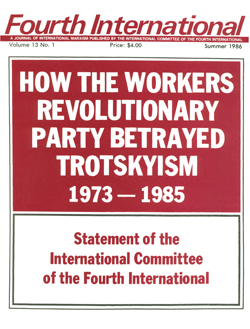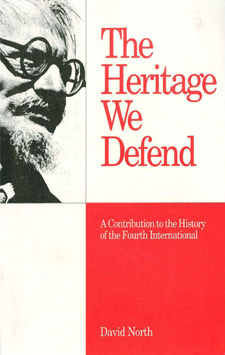About this Section
This library contains material from the history o f the Marxist movement from the 1840s to the present. Although we present Marxist classics in general, our focus is on the history of the Trotskyist movement, with special attention devoted to the history of the ICFI since its inception in 1953.
We begin with the most recent documents from the founding congress of the Socialist Equality Party in August 2008. Other sections will develop in the next few months, with new material added frequently.
Recent Documents
-
The Historical and International Foundations of the Socialist Equality Party (US)
This document reviews the history of the international socialist movement from the origins of Marxism through the present day. It was adopted unanimously at the Founding Congress of the SEP, held August 3-9, 2008.
-
Socialist Equality Party (US) Statement of Principles
August 2008
The SEP Statement of Principles outlines the basic conceptions of the SEP and the foundation for membership in the party. It was adopted unanimously at the Founding Congress of the SEP, held August 3-9, 2008.
Socialist Equality Party (Australia) Statement of Principles
The SEP (Australia) Statement of Principles outlines the basic conceptions of the SEP and the foundation for membership in the party.
The Historical and International Foundations of the Socialist Equality Party (Australia)
This document delineates the struggle for Marxism from all varieties of national opportunism, in particular the nationalist doctrines of Australian exceptionalism that have been promoted by the Australian Labor Party and the trade unions for more than a century. In doing so, it establishes the theoretical and political basis of the struggle for socialist internationalism.
The Historical Foundations of the Partei für Soziale Gleichheit (Germany)
The Partei für Soziale Gleichheit (Socialist Equality Party) of Germany held its Founding Congress May 22-24, 2010 in Berlin. The Congress adopted the document “The Historical Foundations of the Partei für Soziale Gleichheit” on May 23.
History of the ICFI (1953 - present)
-
How the WRP Betrayed Trotskyism
Fourth International Magazine - Volume 13 No. 1
In 1985, after a protracted process of degeneration, the Workers Revolutionary Party, the British section of the ICFI, broke decisively from Trotskyism. In May-June 1986, the International Committee of the Fourth International met and made an exhaustive analysis of the theoretical, political and historical issues involved in the WRP's collapse. How the Workers Revolutionary Party Betrayed Trotskyism 1973-1985 was a major step in rearming the movement and preparing for the political battles that lay ahead in building a revolutionary leadership in the working class.
-
The ICFI Defends Trotskyism
Fourth International Magazine - Volume 13 No. 2
In 1985, after a protracted process of degeneration, the Workers Revolutionary Party, the British section of the ICFI, broke decisively from Trotskyism. This publication, the companion volume to "How the Workers Revolutionary Party Betrayed Trotskyism 1973-1985," presents the key documents of the split as it unfolded from 1982 to 1986. These documents provide a clear record of the struggle waged by the International Committee to defend the fundamental principles and program of the Trotskyist movement.
-
David North - The Heritage We Defend
A Contribution to the History of the Fourth International
The Heritage We Defend is a Marxist analysis of the history of the Fourth International since the assassination of Leon Trotsky in 1940. Concentrating on the central political and theoretical issues which have confronted the Fourth International during the five decades of its existence, this volume examines the implications of the struggle waged by the Trotskyist movement against Stalinism, bourgeois nationalism and various forms of petty-bourgeois radicalism.
Trotsky's Assassination to the Founding of the ICFI (1940-1953)
-
James P. Cannon - A Letter to Trotskyists Throughout the World - 1953
This Open Letter to the Trotskyist Movement signalled the founding of the International Committee of the Fourth International.
History of the early Trotskyist Movement (1923-1940)
Leon Trotsky - Lessons of October - 1924
Trotsky's preface to his writings on 1917 which sparked an intense debate over the essential lessons of the seizure of power by the Bolshevik Party in October 1917 in Russia.
Leon Trotsky - Culture and Socialism - 1927
This work concisely explains the fundamentals of a Marxist approach to culture and art, explaining the link between the growth of technological culture and mass acquisition of artistic and spiritual culture in the 1920s USSR.
Leon Trotsky - In Defense of October - 1932
Trotsky's speech in defense of the October Revolution which he gave to students in Copenhagen in 1932.
Leon Trotsky - Stalinism and Bolshevism - 1937
Written in the midst of Stalin's Terror, which exterminated the Old Bolsheviks who had led the October Revolution, this pamphlet by Trotsky analyzes Stalin's claim to be the continuator of Bolshevism...
Leon Trotsky - The Transitional Program - 1938
Founding document of the Fourth International in September 1938.
Leon Trotsky - Marxism in Our Time - 1939
Written as an introduction to a one-volume abridgement of Marx's Capital, this work is one of Trotsky's clearest statements on the role of Marxism today, on the prerequisites of socialist revolution, and on the crisis facing the international capitalist system.
Leon Trotsky - A Petty-Bourgeois Opposition in the SWP - 1939
Trotsky deals here with a skeptical petty-bourgeois tendency that had arisen in the US Socialist Workers Party (SWP) in the late 1930s, led by James Burnham and Max Shachtman. After reviewing the theoretical issues over which disagreements had first arisen -- notably the materialist dialectic, to which Trotsky gives a masterful introduction -- Trotsky reviews the organizational and political consequences of Burnham's and Shachtman’s desertion of Marxist theory: e.g. the growth of factionalism, and of ambiguous and abstentionist positions on the question of the USSR and international politics. This text is from In Defense of Marxism, which was published in 1942.
Leon Trotsky - Three Conceptions of the Russian Revolution - 1939
From his unfinished biography of Stalin, Trotsky explains how his theory of permanent revolution differed from the conceptions of the Russian Revolution advanced by Plekhanov and Lenin.
The Russian Revolution through the Fourth Congress of the Comintern (1917-1923)
Leon Trotsky - Report on the World Economic Crisis and the New Tasks of the Communist International - 1921
In this report, Trotsky introduces the concept of the curve of world capitalist development and uses it to elucidate the revolutionary potential of the world situation. He details the titanic political and economic shifts unleashed by World War I -- the ruination of Europe, the development of industry especially in the US and Japan, and the unstable financial trickery which had permitted the re-establishment of a certain capitalist equilibrium in post-war Europe. Trotsky explains the tensions building up inside the capitalist system: the risk of a crisis of overproduction and the continued development of militarism -- a remarkable anticipation of the twin crises of the Depression and World War II.
Marxist Classics (1848-1917)
Karl Marx and Friedrich Engels - The Communist Manifesto – 1848
The first and most systematic exposition of scientific socialism, written on the eve of the revolutions of 1848 throughout Europe....
Friedrich Engels - Socialism: Utopian and Scientific - 1880
Praised by Marx, this work is a concise presentation of scientific socialism.
Friedrich Engels - Ludwig Feuerbach and the End of Classical German Philosophy - 1886
In this seminal work, published in 1886, Engels explains the development of Marxism in relation to its philosophical predecessors: Hegelianism and the materialism of Feuerbach.
Vladimir Lenin - Materialism and Empirio-criticism - 1909
Materialism and Empirio-criticism is a refutation of the idealist philosophical trend known as Russian Machism. In replying to members of his own party that sought to pass off Machism as Marxism, Lenin gives a concrete overview of Marxian Materialism, including its application to the great scientific problems of the 20th century.
Vladimir Lenin - Karl Marx - 1914
This work, written from July-November 1914 for publication in one of Russia's most popular encyclopedias, contains a general overview of the Marxist doctrine as well as a biographical sketch of Marx. It is perhaps the most comprehensive overview of Marxism in so short a document, and is infused with Lenin's distinctive polemical vein; here, as in all of his writings, Lenin defends the international and revolutionary essence of Marxism at a time when the majority of the leaders of the Second International were contorting Marx's teachings into a doctrine of reformism and lining up behind their ruling classes in the First World War.








Follow the WSWS